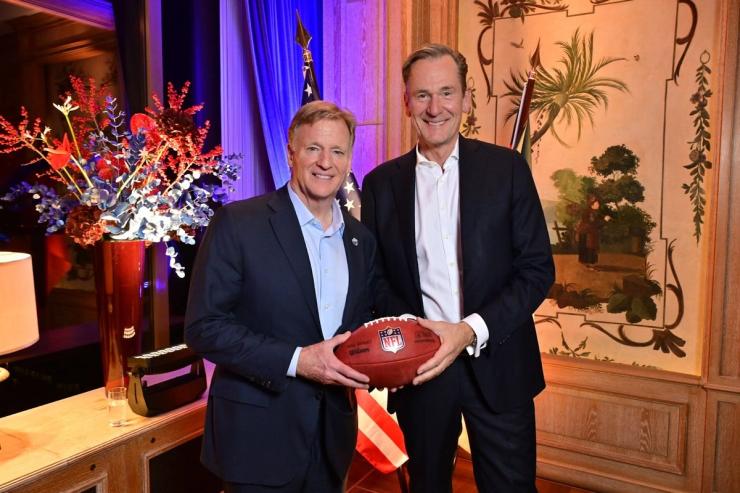The Scoop
Axel Springer CEO Mathias Döpfner, a 6′7″ 62-year-old German who is quick to remind you that he began his career as a journalist, was at the company’s stylish downtown Manhattan townhouse last Monday. He was there to interview music legend Nile Rodgers for his podcast, MD MEETS, which has landed megawatt guests like OpenAI’s Sam Altman and Spotify’s Daniel Ek.
Later in the evening, he was a keynote speaker at Lazard’s Foursquare Conference dinner, where he fielded questions in an onstage discussion with David Rubenstein, the chairman of the Carlyle Group (and a Semafor investor).
On Wednesday, he spoke at a town hall for employees at Business Insider’s HQ, where he discussed his vision for AI in the newsroom — he has said that there will be two kinds of companies, those that embrace AI and those that die — and then hosted a board meeting back at the townhouse.
By Friday, Döpfner was back in Berlin, hosting a celebratory dinner at Axel’s Berlin tower for a US media titan: National Football League Commissioner Roger Goodell. The commissioner was in town for Sunday’s game between the Atlanta Falcons and the Indianapolis Colts, the first regular season NFL game ever played in Berlin. (Bild, another Axel Springer property, has a deal for NFL game highlights in Germany.)
Last April, Döpfner closed the deal to spin off his company’s lucrative German classified advertising businesses and bought out his partner, the private equity firm KKR. It was “a very moving and emotional moment for me,” he wrote his staff on both continents. Now, Döpfner is emerging as a new-school mogul: ubiquitously public, sitting on a pile of cash, and on the hunt for more deals.
Döpfner nearly bought the FT in 2015, before losing it to Nikkei, and took a controlling stake in Business Insider — at the top of the new media market — for $343 million. It paid $1 billion for Politico in 2021. But Döpfner remains on the hunt for new acquisitions, attracted to both the prestige of established American media and the relevance of a successful startup.
According to two people familiar with the discussions, earlier this year, Döpfner talked to Bari Weiss about buying her opinion site, The Free Press. Döpfner and Weiss had developed a friendship in recent years over their shared political views around free speech and support for Israel; she has occasionally written for Die Welt and solicited advice from Döpfner as she built her independent media company. One person familiar with the situation said that while Döpfner and Weiss had discussed Axel Springer acquiring the Free Press, Axel Springer never submitted a formal bid. (Paramount ultimately bought the FP for more than Axel Springer was willing to pay).
In recent months, Döpfner has mused privately to people close to him about buying CNN if it is eventually spun out from Warner Bros. Discovery, one person with knowledge told Semafor. He has also said he is interested in buying Bloomberg Media if it is decoupled from Bloomberg’s financial information business when founder Michael Bloomberg exits the company and it becomes part of Bloomberg Philanthropies. And as Semafor previously reported, Axel Springer’s top target internally is the Wall Street Journal, should the company ever be able to pry it out of NewsCorp’s hands.
Axel Springer also took a look at acquiring Air Mail, one person familiar with the talks told Semafor, but ultimately passed (the company was folded into Puck earlier this month).
Max’s view
At a moment of increasing niche-ification of the news media business, Axel Springer is running in the opposite direction.
Where many US media companies have attempted to diversify their businesses to shield themselves from expensive, liability-generating newsrooms, Axel Springer has leaned in.In June, Axel Springer rolled out its new strategy for strategic growth: leaning into AI-driven journalism, expanding its marketing platforms, and developing new growth areas with the goal of doubling the company’s value within five years.
Still, the company faces the same existential headwinds that have scared other would-be moguls away from the news business. The collapse of social and search traffic has shrunk its audiences, particularly at Business Insider, which has long relied on clicks. Politico briefly found itself in the center of a federal spending fight earlier this year when Trump administration officials attempted to cut off federal agencies’ expensive Politico Pro subscriptions (two people familiar with Politico’s finances said the company was frustrated by the decision to cancel subscriptions, but the cuts did not make a meaningful dent in Politico’s revenue).
And even as Döpfner muses about big acquisitions, he is cutting costs at its existing media properties. Axel Springer laid off 20% of its staff at Business Insider, and has instituted strict spending limits at Politico that have left employees grumbling about the outlet’s inability to match some of the salaries of its competitors. Bild, the German tabloid newspaper, cut six of its 18 regional editions in 2023, closing regional offices and laying off hundreds of employees.
Now, Döpfner believes the industry is in a period of disruption again, this time from AI. That transition may see Döpfner shed some of his existing properties.
In recent months, he has privately told senior staff that Axel Springer would be open to selling some of its media brands if anyone made a compelling offer, a comment that has ricocheted around the company and raised eyebrows.


